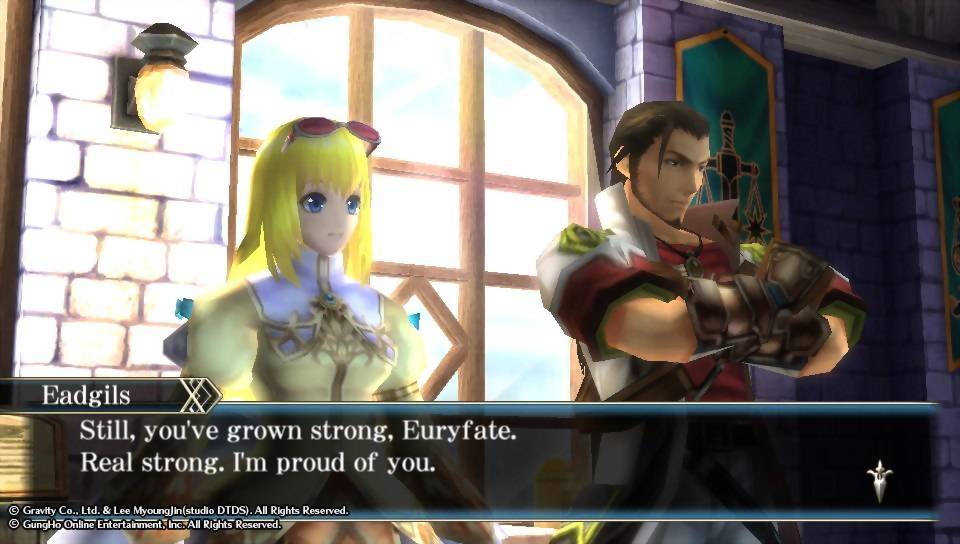
As I mostly play older video games, or at least, few new-release games, I feel like my reviews should include a preface on why I decided to play what I did. There’s generally a logical through line; like how purchasing an Xbox 360 compatible arcade stick prompted me to play so many of the shoot ‘em ups on that console, or how the announcement of a spiritual successor to the Suikoden series finally encouraged me to start the first entry.

In the case of Ragnarok Odyssey Ace, there were a couple of reasons, despite the fact I had no experience with its source material. Dating back to the core game’s release on the PlayStation Vita in 2012, its vibrant anime-inspired settings and visuals seemed to be right up my alley. It also appeared to be an action-RPG in the vein of Phantasy Star Online, one of the most formative games in terms of my taste. And it was developed by Game Arts, the Tokyo developer behind a pair of influential RPG series: Lunar and Grandia, the latter being one of my favorites. From afar, this seemed to be a game tailor-made for me. But alas… it wasn’t.
As I mentioned, I assumed Ragnarok Odyssey Ace would have more in common with Phantasy Star Online than it actually did. In that game, I spent hundreds of hours leveling characters, replaying stages on harder difficulties for better loot drops, and powering up rare weapons, without getting bored. This game turned out to be slightly less of an RPG, however. As someone who still hasn’t played an entry in the Monster Hunter series, it seems to have more in common with that style of game, which makes sense as Ragnarok Odyssey was originally released exclusively on the Vita. There was a market for similar games on that platform, especially in Japan, when the hugely popular Monster Hunter series jumped from Sony’s handheld devices to Nintendo’s.

That said, structurally, it was actually quite similar to Phantasy Star Online. After selecting a character class and customizing my avatar, I undertook a variety of odd jobs from a quest counter. They were mindless kill x number of this foe, or collect x number of this drop, with some narrative bits thrown in every now and then. Based on the South Korean MMORPG Ragnarok Online, which in turn was based on the manwha by Lee yung-jin, Ragnarok Odyssey was set in a fantasy world inspired by Norse mythology. Accordingly, every dozen or so quests would include a boss fight against a massive creature of Norse lore, or I’d have to protect our little castle town from attacking giants.
So the mission design wasn’t engaging; I just hacked and slashed my way from room to room until I had met the objective. Back at town, I’d sell some loot, see if there were any improvements I could make to my gear, and repeat. It was quite boring, which honestly, PSO could be too. But comparing the two, it felt like there was more to do in PSO, that there was always something else I was working on besides the main quest line. And really, the only thing this game was lacking is a character level. Simple as it sounds, something like a character level can go a long way when you’re driven to see “the numbers go up;” that is, the damage I dealt.

Despite that, I trucked along with the game for about twenty hours before burning out. I wasn’t really enjoying myself, but seeing as I was already about two-thirds of the way through, momentum took over. Ever the optimist, I also held on thinking things might change, that something might click for me and I’d get it. Still thinking optimistically, I’d like to believe that moment may have eventually come. Ultimately though, I ran into a difficult stretch of quests that I just couldn’t seem to overcome.
Like its influences, this was a game designed with cooperative multiplayer in mind, but whose campaign was also playable entirely alone. I didn’t have too much difficulty in those first twenty hours, thanks to a trio of chances per quest, a couple of AI partners, and a general lack of challenge. I’m sure there’s a way for me to best the bosses that eventually me back, but I just couldn’t figure out what that was. I tried different classes (which admittedly, I wasn’t experienced with), different load outs (which admittedly, probably weren’t well synergized), and… well actually, the answer was probably to grind out material drops and explore the crafting system (which admittedly, I hadn’t up to that point). Up against that wall though, disappointed with what the game and just straight up not enjoying myself, it was easier to just throw in the towel, momentum be damned.
And so, a playthrough that started with so much promise petered out before the credits rolled.
![Ragnarok Odyssey Ace [PlayStation 3] – Review](https://mybrainongames.files.wordpress.com/2022/01/ragnarok-odyssey-ace-playstation-3-north-american-box-art.jpg?w=672&h=372&crop=1)

